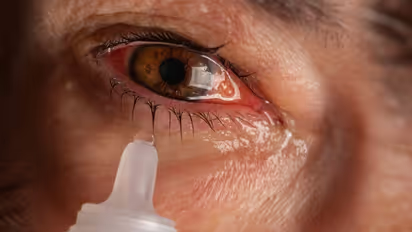Itchy, red, and watery eyes: Decoding the signs of Conjunctivitis, how to prevent it & more

Synopsis
Here's how you can identify the symptoms of conjunctivitis, also known as pink eye, and understand its causes. The humid weather offers a favourable environment for bacteria and viruses to grow and spread, contributing to increased cases of highly contagious eye infections.
Conjunctivitis, commonly known as "pink eye," is a prevalent eye condition that can affect people of all ages. It is characterized by inflammation of the conjunctiva, the thin and transparent tissue covering the white part of the eye and the inner surface of the eyelids. Conjunctivitis can be caused by various factors, including viral or bacterial infections, allergies, or irritants.
Symptoms of Conjunctivitis:
- Redness: One of the most noticeable signs of conjunctivitis is red or pink discoloration of the affected eye. The white part of the eye may appear inflamed and bloodshot.
- Itching and Irritation: Conjunctivitis often leads to persistent itching and irritation in the affected eye. This may cause discomfort and a constant urge to rub the eye, which should be avoided, as it can worsen the condition and potentially spread the infection.
Also Read | 5 easy tips to get a good night sleep
- Watery Discharge: Conjunctivitis can cause the eyes to produce a watery or mucous-like discharge. In bacterial conjunctivitis, the discharge is usually thicker and yellow or greenish in color.
- Crusting and Stickiness: Upon waking up, individuals with conjunctivitis may find their eyelids stuck together due to dried discharge accumulating during sleep.
- Sensitivity to Light: Some people with conjunctivitis may experience increased sensitivity to light (photophobia), leading them to avoid bright environments.
- Blurred Vision: In severe cases or when left untreated, conjunctivitis can cause temporary blurred vision, affecting daily activities.
Also Read | Power of postures: 6 ways it impacts your health
How to prevent Conjunctivitis:
When it comes to avoiding the transmission of illnesses from one person to another, good hand cleanliness is crucial. Therefore, it is essential to constantly wash your hands to stop the spread of infections.
- Every two hours, wash your hands or sanitise your surfaces.
- Don't touch your eyes.
- A conjunctivitis patient should stay home alone for a few days until the watering and discharge stop.
- Never share bedding, towels, or handkerchiefs with someone who has conjunctivitis.
- Avoid public spaces, particularly water parks and swimming pools in general
Also Read | Cosy Haven: 7 tips to create a relaxing home environment
You may protect yourself and others against illnesses by practising excellent hand hygiene, abstaining from touching your face, and exercising caution in crowded places. When experiencing symptoms of conjunctivitis, seeking medical advice from an eye care professional is essential for accurate diagnosis and appropriate treatment.
Additionally, taking preventive measures, such as practicing good hygiene, avoiding close contact with infected individuals, and not sharing personal items like towels and eye makeup, can help reduce the risk of conjunctivitis transmission. Early recognition and prompt treatment can speed up recovery and minimize complications, ensuring healthy and comfortable eyes for all.
Also Read | What is 'Uterine fibroids'? Busting myths related to non-cancerous growth in the uterus
Explore the latest Lifestyle News covering fashion, wellness, travel, Food and Recipes, and more. Stay updated with trending Health News, fitness tips, and expert insights to inspire your daily living. Discover personalized lifestyle trends that keep you stylish and informed. Download the Asianet News Official App from the Android Play Store and iPhone App Store for everything that adds value to your everyday life.